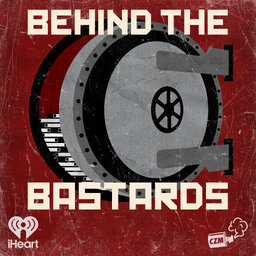Explicit
Behind the Insurrections - The Business Plot: When Rich Fascists Almost Took Over America
In the early 1930s a consortium of America's wealthiest men conspires to overthrow President Roosevelt and institute a fascist state. This is the story of how they almost succeeded.
Learn more about your ad-choices at https://www.iheartpodcastnetwork.com
In 1 playlist(s)
Behind the Bastards
There’s a reason the History Channel has produced hundreds of documentaries about Hitler but only a …Social links
Follow podcast
Recent clips

The Greg Bovino Episode Extravaganza!
1:19:38

Part Three: Romana Didulo: Queen of Canada
48:03

Part Two: Romana Didulo: Queen of Canada
1:10:37
 Behind the Bastards
Behind the Bastards